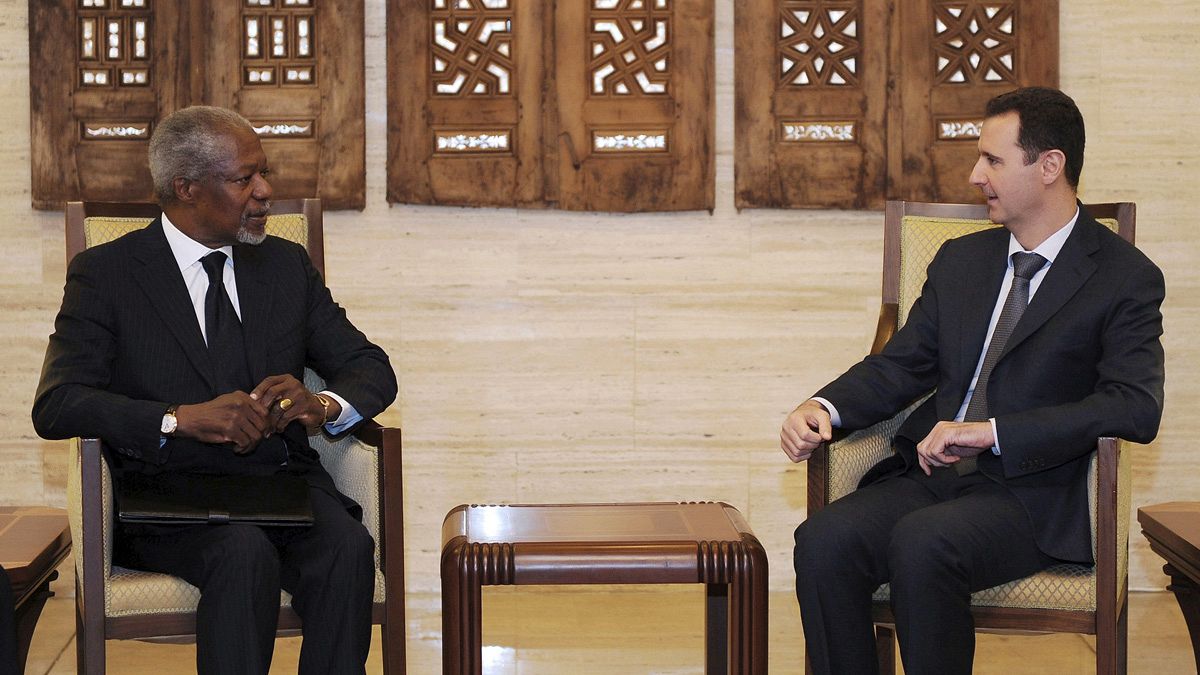Here are some of the main points about international diplomatic efforts in Syria.
The special envoy of the UN and the Arab League met the president of Syria one year after the uprising there began. It was a month ago. Kofi Annan heard Bashar al-Assad accuse his opponents in Syria of being terrorists blocking political solutions. The UN emissary made slow progress. On March 27, he announced that Damascus had accepted his peace plan.
In simple terms:
The violence must end. The UN estimate of the death toll over 12 months is more than 9,000. Both sides had to stop. Damascus agreed to halt offensive operations on the morning of April 10. Opposition forces agreed to April 12.
An open political process must start. The Syrians need to respond to people’s legitimate concerns. They need to designate authorised interlocutors. A demand in the previous plan by the Arab League that Assad step down is not in Annan’s plan.
Access by humanitarian assistance organisations must be guaranteed in all areas affected by fighting.
The UN says nearly 40,000 Syrians have been made refugees by the fighting. The Red Crescent says 200,000 have been displaced.
Arbitrary detention must stop. People held arbitrarily must be set free. The names of those kept locked away must be provided, and the places where they are held be made accessible.
Journalists must be allowed to move around throughout the country. Permission to do this should be issued on a non-discriminatory basis.
The Syrian authorities must respect rights of free association and peaceful protest.
Today the Syrian army was scheduled to begin putting the plan into action.
euronews spoke to Abdul Raouf Darwish, the chairman of the 15th of March Association for Democracy in Syria, in Paris.
Kawtar Wakil, euronews: Mr Darwish, the acts of violence continue in Syria and it seems that there are more doubts about the implementation of the peace plan proposed by Annan and accepted by both sides of the Syrian conflict. What are your thoughts on this?
Abdul Raouf Darwish: As you know, the nature of the Syrian regime does not make it possible to proceed with reforms, to put all these initiatives into practice. So, as happened with the Arab League plan, Damascus accepts and then changes its mind, and sets up obstacles, doesn’t apply it, until things get worse. It is doing the same thing with Kofi Annan’s plan.
euronews: In your opinion, why has Damascus waited a long time to call for written guarantees from the opposition and Arab countries to stop the violence?
Darwish: It did the same thing with the Arab League initiative. First it accepts and then it sets conditions so that application of the plan becomes remote. This is because applying Annan’s plan means the end of the regime or the political system as Syria knows it. The most important reason among many is that the plan includes the right to demonstrate, and calls for troops to be withdrawn from Syrian cities.
euronews: Syrian Foreign Minister Walid Muallem said in a press conference in Moscow that Syria has withdrawn some units of the army from some cities and confirmed that the government is keen to stop the violence. What is the opposition Transitional National Council’s position about the new conditions of the Syrian government?
Darwish: Some units have been pulled out of certain cities in order to send them to others, the goal being to conduct other violent repressive operations. For example, it happened in Idlib province. Tanks were withdrawn from some villages and deployed in others, proceeding to kill innocent people and destroy homes. In my opinion, the National Council’s position on this is clear: those in charge have declared that the Syrian regime has in fact rejected the Annan initiative and only accepted it as a delaying tactic.
euronews: Would the deadline for withdrawal of Syrian military forces from cities reduce the prospects for the implementation of the cease-fire proposed by the United Nations?
Darwish: If the regime really wanted to apply the cease-fire, the least it could do is show its good intentions in responding to the international community’s request.
